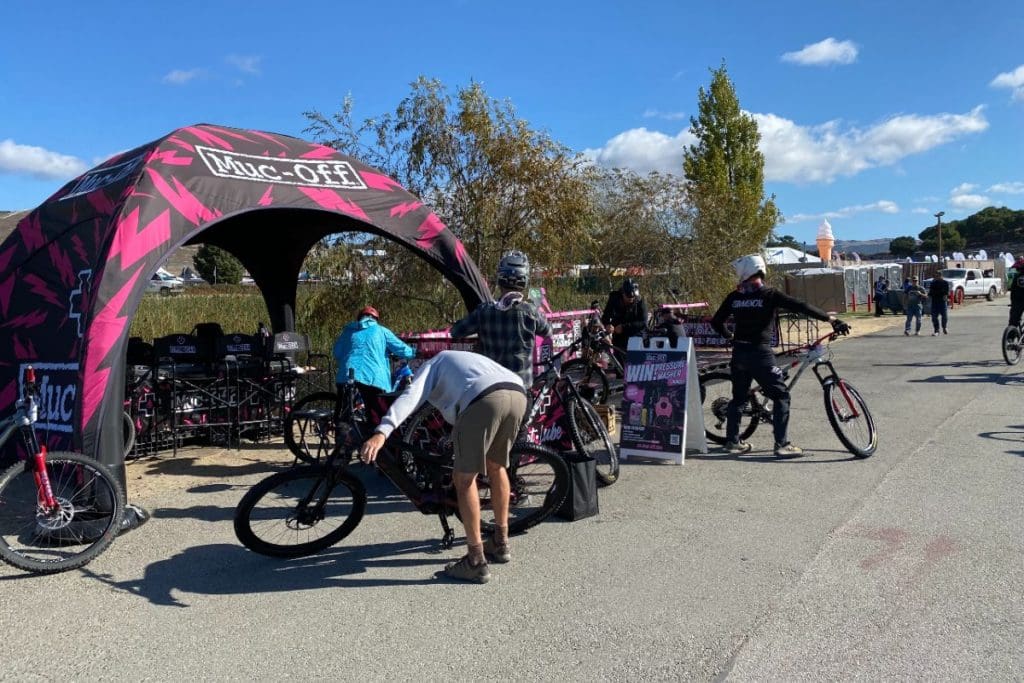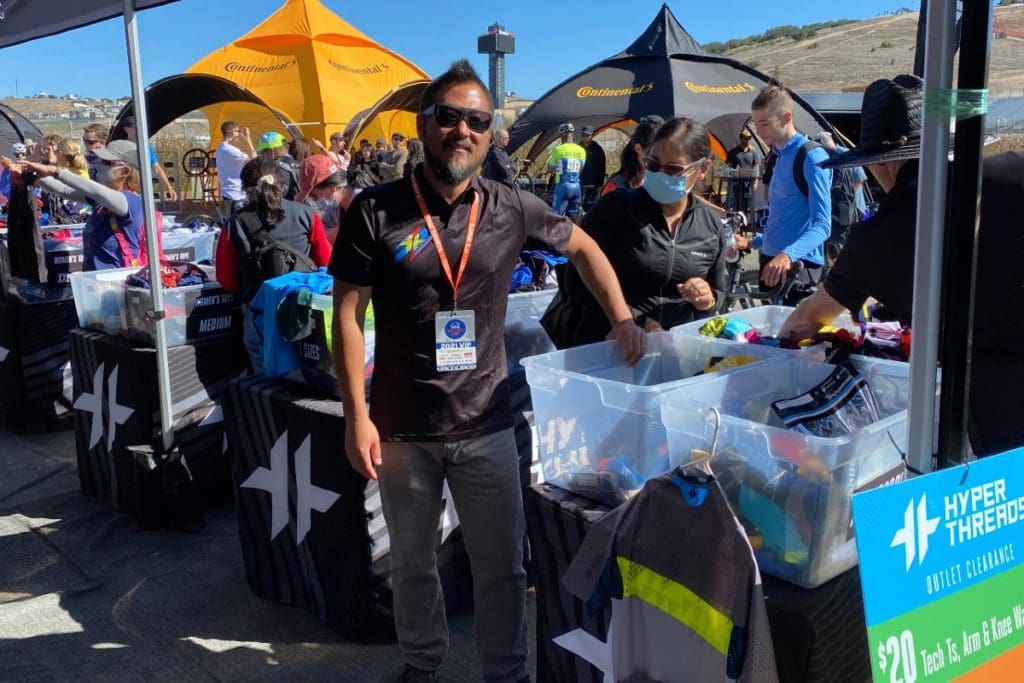Sea Otter Springs Back From COVID Hibernation

Monterey, California
Sea Otter Classic roared back to life in October.
Never mind that it was a late-season interim expo, or that some exhibitors like SRAM, Santa Cruz, Cannondale and others passed because of ongoing uncertainty posed by COVID-19.
Visitors were greeted by clear blue skies and warm weather tempered by afternoon gusts that kicked up swirls of dust. Worries over the pandemic failed to temper a surging crowd of amateur racers and consumers who flocked to Monterey’s Laguna Seca Raceway for the event from October 7th to 10th.
Sea Otter’s director, Frank Yohannan, was surprised and pleased by the turnout.
“We weren’t sure what to expect. Early signs were positive but you really never know until you get to the day of the event,” according to Yohannan, who sold Sea Otter to Life Time Inc. in August, a publicly traded multi-billion dollar fitness and event company.
Yohannan estimates the four-day festival attracted about 61,500 people, compared to 2019’s record visitation of 77,000. Those numbers include consumers, racers, exhibitor staff and campers who set up tents and RVs at campsites surrounding the raceway.
If there was a downside, it was the dearth of visitors and exhibitors from Europe, Asia, South America and Canada. International travel under complex rules imposed over Covid-19 made it near impossible to get to the US and equally difficult to return home.
“We’re already spinning up for next April, which is right around the corner,” Yohannan said.
As soon as the October festival ended, exhibitors were calling expo sales director Sarah Timlek to confirm space and location in preparation for the April 7th-10th, 2022 show.
“It was just back-to-back phone calls,” Yohannan said.
The surprising number of attendees this year generated smiles among exhibitors at every expo booth.
Coming Out Party for e-Bikes
On another level, it was a coming-out party for e-bikes, particularly e-MTBs.
While e-bikes have grown as a category at Sea Otter over the past few years, October’s event highlighted the fast-growing movement for plug-ins. A score of new e-bike companies were pushing everything from mountain bikes, road bikes, commuter bikes, touring bikes and fat-tyre bikes to consumers seemingly eager to move from analogue to electric.
Booths like Aventon, which sells consumer-direct as well as through IBDs, enjoyed a constant flow of consumers. And Benno, a line of e-bikes created by Electra Bicycles co-founder Benno Baenziger, dealt with non-stop questions posed by consumers eager to learn more.
Issues about supply chain disruption were temporarily put on the back burner as exhibitors had their first taste of a major consumer event since COVID-19 transformed the globe two years ago.
FSA’s managing director for US operations, Mark Vandermolen, said Sea Otter exceeded his expectations.
“We’re pleased that we came, for sure. It’s been almost two years and it feels like nothing has happened,” he said.
The Washington-based company is a subsidiary of Taiwan manufacturer Tien Hsin Industries, which has three factories on the island and boasts a wide range of CNC machining capabilities. Still, it’s been hard-pressed to meet global demand for its components.
FSA’s OEM sales director, Len Cabaltera, said: “Right now we’re looking at lead times of 300 to 360 days, depending on the component. For example, FSA is 180 days out for headset orders and we’ve been air freighting some high-value parts into the US when available.
“It seems like almost everything is a problem.”
Bianchi USA’s president, Pat Hus, echoed those concerns. The company has a complex supply chain with operations in Taiwan, China and Cambodia, as well as a paint and assembly factory in Treviglio, Italy. Getting bikes into the US market has been a problem.
“If I had more of them, I could sell them,” said Hus, whose booth was flooded with consumers looking at Bianchi’s product line.

Hyper Threads, a Utah apparel company, was flooded with consumers picking through its clearance bins looking for bargains on jerseys, shorts, gloves and other technical cycling gear. Company founder Kevict Yen said he was selling upwards of $10,000 a day – cash and credit – of out-of-date stock.
“We never gave much thought to pulling out. Our thinking was that this (October event) was an interim stepping stone into next April,” he said.
“We did tone down a little and trimmed our footprint, but still we look pretty big in a slightly smaller pond.”
Yen has deep industry roots. He spent four years as vice president of Asian operations at RockShox and a stint at Fox Racing Shox as a business development manager.
But like most companies, Yen has struggled with supply chain issues. With soft goods manufactured at a variety of Asian factories, he has seen lead times go from a normal four-week turnaround to lead times now exceeding 10 weeks.
“There’s just been more demand than (factory) capacity than I anticipated and that, combined with shutdowns, has pushed the company,” he said.
Surprisingly Busy
Campagnolo’s North American OEM sales manager, Martin Kozicki, was surprised by Sea Otter’s heavy foot traffic.
“We’ve had excellent traffic and we’re very happy to be here doing this event. We just didn’t expect it to be this busy,” Kozicki said.
Campy’s offices in Carlsbad, California, generally supplies small OE operations in the US and at the moment it’s about 11 months out in supplying drivetrain components, Kozicki said.
Forecasts at Campy put the Italian manufacturer at 100% of capacity through 2023.
Alta Cycling Group vice president Rob Kaplan said high consumer interest in its Diamondback, Raleigh, iZip and other lines kept his booth hopping. The company also distributes Haibike and Ghost. But like other suppliers, the Washington company can’t meet demand.
Kaplan put it this way: “It’s like we’ve gone from 30 years of always having excess inventory to selling-in all we have. So let’s be happy where we’re at for the moment.”
But demand has forced Alta to up its prices, particularly on entry-level models that two years ago retailed for about $400. Today that same bike sells for about $635 – a 59% hike.
Kaplan added a somewhat positive note to the state of the current market disruption.
“In the 18 months that we’ve had constrained supply, consumers are no longer asking for discounts,” he quipped.
Custom Vans Capture Imagination
The ‘overland market’ has become a burgeoning category at Sea Otter. Spiffed-up Mercedes Sprinter vans, as well as full-size versions of Ford Transit vans, outfitted with stoves, sinks, heaters, beds and room for several bikes, were a consumer hit.
California company Muse & Co. Outdoors was a new entrant to the overland market. It had a $220,000 four-wheel-drive Sprinter on-site, enticing a steady stream of tyre kickers inside to take a look.
The company’s marketing specialist, Marika Pickles, told me the foot traffic had been non-stop since opening day.
She acknowledged that not many could afford the company’s premium model.
“But it is aspirational,” she said.
